 |
| Tom Hiddleston,Elizabeth Debicki and Hugh Laurie |
After The Night Manager: five of the best Le Carré novels
So you loved Tom Hiddleston undercover. Here are more John le Carré thrills
Steven PooleFridat 25 March 2016
A
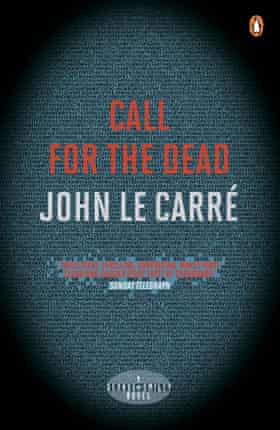
Call for the Dead (1961)
The debut of David Cornwell writing as John le Carré while still employed in British intelligence, and the debut of his celebrated spy hero George Smiley, introduced memorably thus: “Short, fat, and of a quiet disposition, he appeared to spend a lot of money on really bad clothes, which hung about his squat frame like skin on a shrunken toad.” As Smiley investigates the death of a Foreign Office official, which might have had something to do with East German intelligence, his patient brilliance becomes clear. Above all else, we are told, Smiley loves “academic excursions into the mystery of human behaviour, disciplined by the practical application of his own deductions”. In other words, he is a spy, but he is also one of literature’s great detectives.
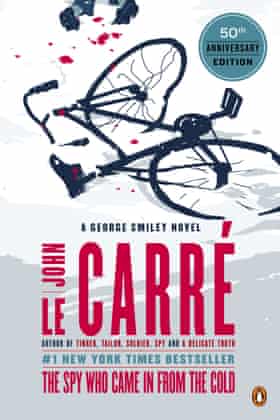
The Spy Who Came in from the Cold (1963)
Le Carré’s third novel became his first bestseller. It was, he has written, motivated by moral disgust and anger at the construction of the Berlin Wall – “a dirty, ugly thing of breeze blocks and strands of barbed wire”, as one character here describes it – and written in only six weeks. In this icy noir, the titular spy Leamas returns to London after a disaster in Berlin, and looks set on becoming an alcoholic burn-out case when his superiors at “the Circus” (Le Carré’s term for MI6) persuade him to go on one last mission. The reader suspects strongly it will not be an unalloyed triumph. Le Carré’s addictively bleak vision of cold war espionage in this and other books is one of a seedy purgatory where our side is just as morally compromised as theirs. This novel is a thing of driving, bitter perfection, perhaps Le Carré’s best.
Tinker Tailor Soldier Spy (1974)
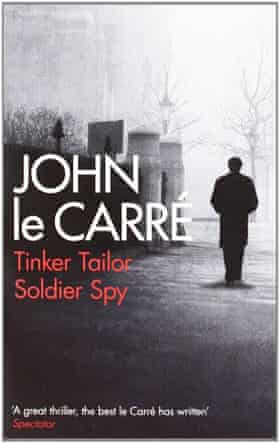
If you have understandably forgotten the rationale behind this book’s title after seeing the exquisitely confusing film version with Gary Oldman, then one of the great pleasurable “Aha!” moments in modern fiction awaits you. This is the definitive story of a molehunt, inspired in part by the treachery of KGB spy Kim Philby, who Le Carré has said blew his cover and ended his intelligence career. In the novel, it becomes clear that someone within the Circus is actually working for the Soviets, so Smiley – with his exhausted melancholy, his catastrophic love life, and his lovably pedantic skills of inquiry – is brought out of retirement to hunt him down. This book inaugurates the “Karla trilogy”, named after Smiley’s wily Soviet counterpart, so you will want to follow it up with The Honourable Schoolboy (1977) and Smiley’s People (1979). By the way, the 1979 serial adaptation of Tinker Tailor starring Alec Guinness is probably the best TV drama ever made.
A Perfect Spy (1986)
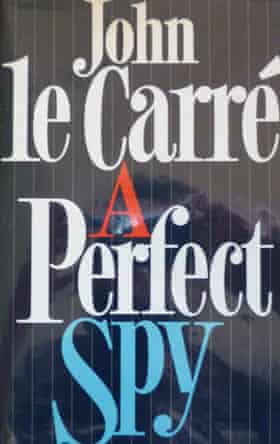
This is Le Carré’s most obviously autobiographical fiction, with its domineering con-man father who recalls the author’s own. It centres on fugitive MI6 officer Magnus Pym, who turns out to have been a double agent, recruited by a charismatic spymaster in Czech intelligence. The novel’s forensic psychological account of Pym’s life represents Le Carré’s most detailed investigation into the kind of damaged and compromised person who makes, according to its brutally ironic title, the ideal espionage agent. “Writing A Perfect Spy is probably what a very wise shrink would have advised me to do,” Le Carré later said. Philip Roth, meanwhile, called it “the best English novel since the war”, possibly having forgotten the Sword of Honour trilogy and Lucky Jim.
The Tailor of Panama (1996)
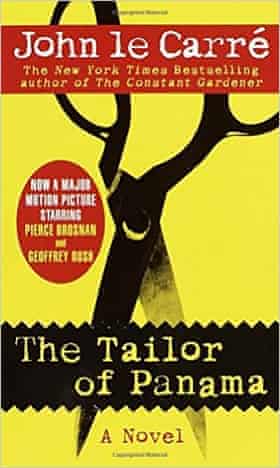
Many of Le Carré’s post-cold war novels are satisfyingly gripping spy stories cleverly arranged to dramatise the author’s anger at specific issues such as the arms trade (The Night Manager), the depredations of the pharmaceutical industry (The Constant Gardener), or the US policy of “extraordinary rendition” (A Most Wanted Man). Least characteristic but tremendously fun is this Graham Greene-style entertainment, a loose riff on Our Man in Havana. The titular character is Harry Pendel, a British ex-con and fantasist who has set himself up in the deafening bustle of Panama as a high-class gentlemen’s outfitter. He spins tall tales to a visiting MI6 agent, the UK and US intelligence establishments start believing them, and everything soon becomes impressively FUBAR’d. It’s a romp: a black satire that juggles with genre expectations, but is still fuelled all the way by Le Carré’s great lifelong theme: deception.


No comments:
Post a Comment